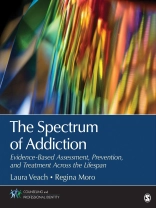Reflecting the latest content in the DSM–5, The Spectrum of Addiction presents a comprehensive overview of addictive behaviors and habits from early use through risky use, severe-risk use, and addiction. Authors Laura Veach and Regina Moro draw from their experience in both teaching and counseling to provide real-world knowledge and evidence-based practices for working with clients who fall within the spectrum of addiction ranging from experimentation to physical addiction and recovery. With a unique focus on neuroscience, integration of CACREP standards, and extensive coverage of addictions across the lifespan, the book serves as a practical resource for future addiction counselors.
The Spectrum of Addiction is part of SAGE’s Counseling and Professional Identity Series.
Cuprins
Preface
Acknowledgments
Chapter 1 Historical Foundations of Addiction Counseling
Learning Objectives
Historical Use of Chemical Substances
History of the Treatment and Recovery Movement
History of Addiction-Related Research
Historical Legislation Efforts Impacting the Field
The Evolving Addiction Treatment Professional
Conclusion
Resources for Further Learning
References
Chapter 2 Understanding the Importance of Evidence-Based Practices for Professional Counselors
Learning Objectives
Overview of Evidence-Based Practices
Defining Evidence-Based
Understanding Research in Action
Importance and Demand for Evidence-Based Practice
Locating Evidence-Based Practices
A Caveat: The Common Factors Model and Evidence-Based Practice
Conclusion
Skills in Action
Resources for Further Learning
References
Chapter 3 Understanding the Brain in the Addictive Process
Learning Objectives
Knowledge: Enhanced Understanding and Brain Research
Evidence-Based Practice
Addiction and Brain Changes
Future Directions
Skills in Action
Case Study
Experiential Skills Learning Activity
Quiz: Brain and Addiction
Answer Key: Brain and Addiction Quiz
Resources for Further Learning
References
Chapter 4 Experimentation and Seeking Altered States
Learning Objectives
Knowledge
Social Pressures: Theories
Social Pressures: Peer, Family, and Community Influences
Family Influences
Gender Influences and Altered States
Cultural Influences
School Influences
Other Influences and College Youth
American Culture
Protective Factors
Successful Community-Based Prevention
Evidence-Based Practice
Skills in Action
Resources for Further Learning
References
Chapter 5 Understanding Risky Use Patterns
Learning Objectives
Knowledge
Risky Drinking
Risky Use of Other Mood-Altering Substances
Risky Use of Prescription Medication
College Students and Binge Patterns: Chemical and Process
Evidence-Based Practices
Identifying Protective Factors and Advocacy
Skills in Action
Resources for Further Learning
References
Chapter 6 Assessment of Risky Use and Addictive Disorders
Learning Objectives
Risky Use
Knowledge
Important Considerations: Laying the Groundwork for Assessment
Rapport-Building and Trust Issues
Assessment of Use Patterns
Evidence-Based Practices
Extensive Assessment Tools
Skills in Action
Resources for Further Learning
References
Chapter 7 Diagnosis of Substance-Related and Addictive Disorders
Learning Objectives
Knowledge
Overview of Current Diagnosis Models
National Institute of Mental Health Research Domain Criteria
International Classification and Diagnosis
DSM-5 and New Updates
Evidence-Based Practices
Skills in Action
Resources for Further Learning
References
Chapter 8 Brief Counseling Interventions
Learning Objectives
History of Brief Interventions
Need and Evolution of the Brief Intervention Model
Definition of Brief Intervention
Evidence-Based Practices in Clinical Settings
Skills in Action
Resources for Further Learning
References
Chapter 9 Intensive Family Interventions
Learning Objectives
Knowledge
Evidence-Based Practices (EBP)
Family Support
Skills in Action
Conclusion
Resources for Further Learning
References
Chapter 10 Societal Systems Impacted by the Addiction Spectrum: Legal, Workplace, and Medical Settings
Learning Objectives
Knowledge
Legal System and the Impact of the Addiction Spectrum
Medical Settings and the Impact of the Addiction Spectrum
Evidence-Based Practices
Skills in Action
Resources for Further Learning
References
Chapter 11 Intensive Addictions Counseling
Learning Objectives
Knowledge
Evidence-Based Practice
Cognitive Behavior Therapy (CBT)
Relational Model
Motivational Interviewing (MI)
Brain Stimulation Approaches
Other Considerations for Intensive Counseling of Individuals With Addictive Disorders
Tobacco
Heroin
Cocaine
Process Addictions
Intensive Levels of Care and Placement Criteria
Skills in Action
Resources for Further Learning
References
Chapter 12 Cross Addictions and Comorbidities
Learning Objectives
Knowledge
Cross Addictions: Evidence-Based Knowledge and Substances
Cross Addictions: Evidence-Based Knowledge and Process Addictions
Cross-Addiction Substance and Process Addictions
Skills in Action: Cross Addictions
Effective Interventions for Cross Addictions
Interventions for Cross Addictions With Emerging Research Support
Comorbidity
Evidence-Based Practices and Comorbidities
Skills in Action: Comorbidity
Resources for Further Learning
References
Chapter 13 Continuing Care and Relapse Prevention
Learning Objectives
Knowledge
Prevalence and Scope of Relapse
Understanding the Importance of Continuing Care to Prevent Relapse
Evidence-Based Practices
Mindfulness
Medication-Assisted Treatment (MAT)
Relapse Prevention Therapy (RPT)
Recovery Communities
Skills in Action
References
Chapter 14 Future Directions for Evidence-Based Addictions Counseling Research
Learning Objectives
Knowledge
Neuroscience and the Brain
An Expanding Definition of Addiction: Behavioral/Process Addictions
Evidence-Based Practices
Holistic Approaches
Building Upon and Re-Examining Established Evidence-Based Models
Importance of Continued Research
Skills in Action
Resources for Further Learning
References
Index
About the Authors
Despre autor
Dr. Regina Moro currently serves as an Assistant Professor in the Department of Counselor Education at Boise State University in Boise, Idaho. She received her Ph D in Counseling from the University of North Carolina at Charlotte with an emphasis in Multicultural Counseling, received a graduate certificate from UNC Charlotte in Substance Abuse Counseling, and an MS in Community Counseling from Syracuse University. Regina is licensed as a Licensed Mental Health Counselor (FL), a Licensed Clinical Addictions Specialist (NC), and is a National Certified Counselor. Her clinical passion involves work with crisis and trauma, including a focus on addiction with individuals and families. Regina has held leadership positions in Counseling organizations, most recently with the International Association of Addictions and Offender Counselors. She enjoys spending her free time enjoying the great outdoors with her partner, Ryan, and their rescue dog, Barkley.












